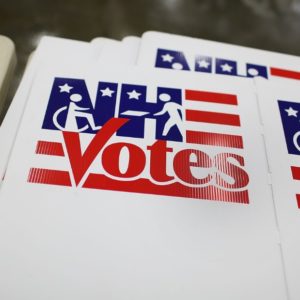MANCHESTER, N.H. — New Hampshire Democrats have a message for the wave of journalists, pundits and presidential candidates preparing to flood the Granite State: You’re not in Iowa anymore.
Sometimes the most obvious differences between the two states are overlooked. Iowa is in the heart of flyover country, while New Hampshire is ensconced among the East Coast elites. President Trump won Iowa by 9 points, while the GOP has only carried New Hampshire once since 1988 (George W. Bush in 2000).
And in the 2016 Iowa caucuses, with contested races in both parties and celebrity candidate Donald Trump making his first ballot appearance, fewer than 18 percent of the state’s 2 million voters participated. Eight days later in New Hampshire, with less than half that number of registered voters, 538,000 voted in the primaries.
“We like to vote in New Hampshire,” says longtime Granite State GOP political strategist Tom Rath. “We have several elections every year with annual town meetings, party primaries, etc. And we keep our governor and the legislature on a two-year leash. We don’t like them to get too far away from our next chance to vote.”
And, based on the polls, Granite Staters also like to vote for Bernie.
The day of the Iowa caucuses, the Real Clear Politics average of New Hampshire polls gave Sanders a 9-point lead over former Vice President Joe Biden. Sanders has led in the last nine consecutive polls and he hasn’t had a single poll performance below the 15 percent threshold since before Thanksgiving. No other candidate can match that.
On one hand, Sanders’ success here is expected. After all, New Hampshire Democrats gave Sanders a stunning 22-point win over frontrunner Hillary Clinton just four years ago. Why wouldn’t they do the same next week?
On the other hand, Sanders’ standing is odd, given the way moderate Democrats continue to dominate the state’s politics.
“When they’re not voting for president, New Hampshire Democrats tend to be more ‘Shaheen Democrats’ than ‘Sanders Democrats,'” says former ambassador Terry Shumaker, a veteran of New Hampshire politics whose support of centrist candidates goes back to Bill Clinton in 1992. “Exhibit A is former Gov. John Lynch, an extremely popular four-term Democrat who’s supporting Joe Biden. With some notable exceptions like former Rep. Carol Shea-Porter, progressive candidates have not fared as well.”
‘Shaheen Democrats,’ is a reference to Sen. Jeanne Shaheen, the first woman in America to serve as both a governor and U.S. Senator. Shaheen, who’s seeking her third Senate term this year, has carefully cultivated her moderate image. When the Lugar Center released its lifetime bipartisanship rankings of the 250 U.S. senators who’ve served since 1993, Shaheen was right in the middle at 114 — hardly a progressive firebrand.
Her New Hampshire colleague Sen. Maggie Hassan was ranked as a bit more partisan (167), but nowhere near Bernie Sanders, who the Lugar Center ranks as by far the most partisan Democrat in the Senate today (247).
When Rep. Shea-Porter retired in 2018, moderate Chris Pappas handily won a Democratic primary that featured several Sanders-friendly candidates including the senator’s own son, Levi Sanders. (He got less than 2 percent of the vote.)
And in a state where both parties have an almost equal number of registered voters, incumbent Republican Chris Sununu has a 60 percent approval rating and is one of the five most popular governors in the country.
Put another way, if Amy Klobuchar were asking New Hampshire Democrats to nominate her for governor — she’d be a lock. But for president? Probably not.
This dichotomy between how Democrats vote at the state and presidential levels can be seen in the ‘endorsement’ primary. Klobuchar is the pick of far more high-profile New Hampshire Democrats than Sanders, despite consistently polling in fifth place and single digits.
Only one of the state’s four Democrats in the all-blue congressional delegation has made any endorsement at all — Rep. Annie Kuster is endorsing Pete Buttigieg, who’s also underperforming in the polls. The Democratic Speaker of the House is backing Biden, while Bernie has to be content with a few rank-and-file state legislators.
These endorsements may reflect sincere support for more moderate presidential candidates, or they may be signs that these local Democrats are looking down the road at their own campaigns after Bernie folds up his Old-Time Progressive Revival tent and heads on to Super Tuesday.
“We tend to like candidates who have a balanced, moderate tone, if not philosophy,” says strategist Rath. “We are not a state of screamers.”

